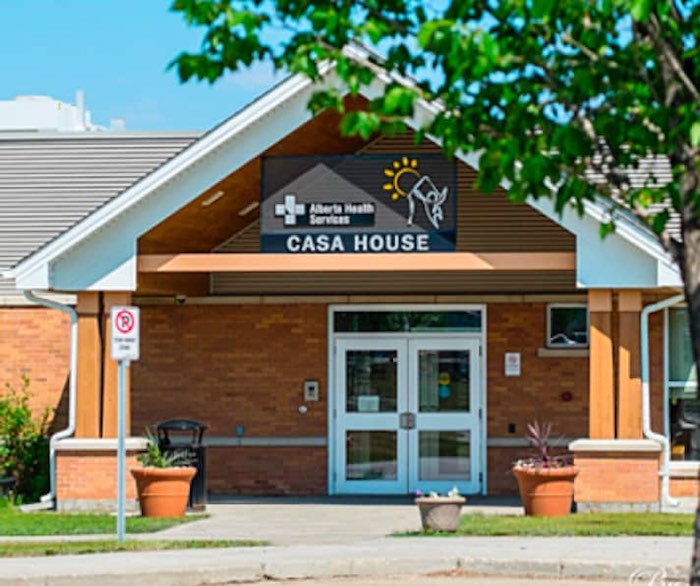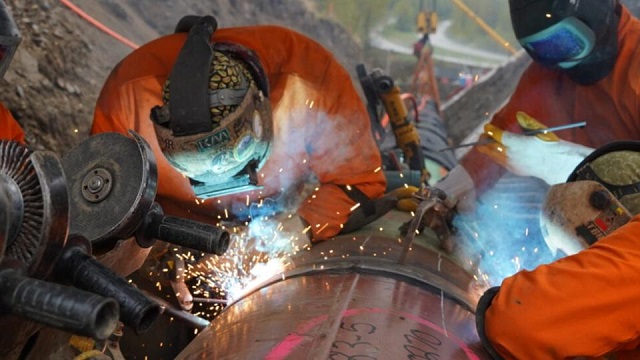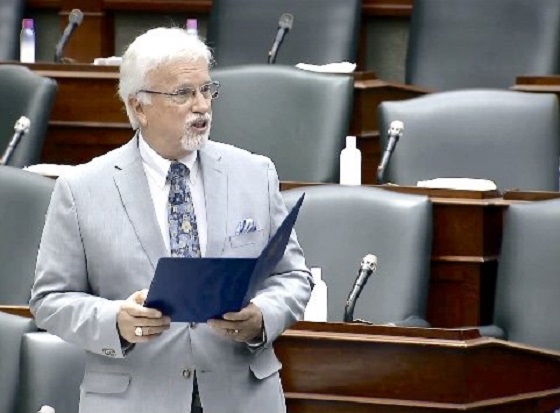Alberta
Province to spend $92 million over next three years to provide mental health treatment for youth

Expanding mental health treatment for youth
Alberta’s government is partnering with CASA Mental Health to expand youth mental health supports to ensure youth across Alberta can access treatment closer to home.
Supporting children and youth who are struggling with mental health is an essential part of Alberta’s recovery-oriented system of mental health and addiction care. If passed, Budget 2023 would invest $92 million over three years to provide critical mental health supports for children and youth in partnerships with CASA Mental Health.
This $92-million investment would include capital and operating funding for two new inpatient CASA House sites in Fort McMurray and Calgary, expanding youth day treatment programs provincially, and the rollout of new mental health classrooms across Alberta.
“Every young person in Alberta deserves the opportunity to access treatment and improve their mental health. If passed, Budget 2023 will dramatically increase access to mental health supports for youth to help families in crisis and provide kids with opportunities to improve their mental health across Alberta.”
“Our goal is to ensure that every young person in Alberta is supported in their pursuit of improved mental health. In partnership with CASA Mental Health, we’re expanding a range of treatment options for youth and their families that includes mental health supports in schools, day treatment programs and new inpatient programs to meet the diverse needs of youth in Alberta.”
Supporting young Albertans with mental health challenges
With this funding, high-intensity services for children and youth will be delivered in community settings, reducing the need for hospital stays. CASA Mental Health will expand four programs that will help more than 700 additional young Albertans every year.
- CASA House (for youth in grades 7 to 12): A live-in program for youth where parents and caregivers are still active participants in treatment, but the youth lives at a CASA facility. Treatment includes individual, group and family therapy, social and life skills training, and on-site schooling in small classroom settings.
- Adolescent Day Treatment Program (for youth in grades 8 to 12): A daily program where youth with a mental illness diagnosis who are struggling in a conventional classroom setting can complete their schooling at a CASA facility while receiving ongoing support, including group, family and individual therapy.
- CASA Mental Health Classrooms (for children and youth in grades 4 to 12): A classroom-based program where students with complex mental health needs receive individual and group therapy. Students are supported by a team of mental health professionals, including a therapist, psychiatrist and behavioural specialist.
- CASA Core (for children and youth aged three to 17): Community-based services where families are matched with the appropriate level of service dependent on the complexity of mental health challenges. Therapy incorporates the child’s family, school and community network in treatment.
“CASA Mental Health recognizes a need for increased service to the ‘missing middle’ of mental health, particularly over the last few years. We see a growing need to provide specialized service to children and youth with mental illness, requiring more than low-intensity community-based services, but less than intensive hospital services. We’re pleased to partner with Alberta’s government to help close that gap and make mental health programming available and accessible to more children and families throughout the province.”
Alberta’s government is continuing to build a recovery-oriented system of care, where everyone struggling with addiction and mental health challenges is supported in their pursuit of recovery. This includes dramatically increasing access to mental health supports for children and youth focused on prevention and early intervention, including the creation of new mental health classrooms, expanding access to digital supports like 211 Alberta and Kids Help Phone, investing in affordable virtual and in-person counselling, and establishing youth mental health hubs across the province.
“CASA Mental Health is a leader in delivering youth-centred mental health services. This organization plays an important role in the Sherwood Park community, and this new partnership with Alberta’s government will help broaden their reach to support children and youth across our province.”
“Children in this province deserve the best care possible, and this funding reflects our government’s commitment to delivering on this promise. I’ve seen first-hand the difference CASA Mental Health makes in the lives of youth in our community, and expanding these services means more families will get the help they need and deserve.”
Budget 2023 secures Alberta’s bright future by transforming the health-care system to meet people’s needs, supporting Albertans with the high cost of living, keeping our communities safe and driving the economy with more jobs, quality education and continued diversification.
Alberta
Game changer: Trans Mountain pipeline expansion complete and starting to flow Canada’s oil to the world

Workers complete the “golden weld” of the Trans Mountain pipeline expansion on April 11, 2024 in the Fraser Valley between Hope and Chilliwack, B.C. The project saw mechanical completion on April 30, 2024. Photo courtesy Trans Mountain Corporation
From the Canadian Energy Centre
By Will Gibson
‘We’re going to be moving into a market where buyers are going to be competing to buy Canadian oil’
It is a game changer for Canada that will have ripple effects around the world.
The Trans Mountain pipeline expansion is now complete. And for the first time, global customers can access large volumes of Canadian oil, with the benefits flowing to Canada’s economy and Indigenous communities.
“We’re going to be moving into a market where buyers are going to be competing to buy Canadian oil,” BMO Capital Markets director Randy Ollenberger said recently, adding this is expected to result in a better price for Canadian oil relative to other global benchmarks.
The long-awaited expansion nearly triples capacity on the Trans Mountain system from Edmonton to the West Coast to approximately 890,000 barrels per day. Customers for the first shipments include refiners in China, California and India, according to media reports.
Shippers include all six members of the Pathways Alliance, a group of companies representing 95 per cent of oil sands production that together plan to reduce emissions from operations by 22 megatonnes by 2030 on the way to net zero by 2050.
The first tanker shipment from Trans Mountain’s expanded Westridge Marine Terminal is expected later in May.
 Photo courtesy Trans Mountain Corporation
Photo courtesy Trans Mountain Corporation
The new capacity on the Trans Mountain system comes as demand for Canadian oil from markets outside the United States is on the rise.
According to the Canada Energy Regulator, exports to destinations beyond the U.S. have averaged a record 267,000 barrels per day so far this year, up from about 130,000 barrels per day in 2020 and 33,000 barrels per day in 2017.
“Oil demand globally continues to go up,” said Phil Skolnick, New York-based oil market analyst with Eight Capital.
“Both India and China are looking to add millions of barrels a day of refining capacity through 2030.”
In India, refining demand will increase mainly for so-called medium and heavy oil like what is produced in Canada, he said.
“That’s where TMX is the opportunity for Canada, because that’s the route to get to India.”
Led by India and China, oil demand in the Asia-Pacific region is projected to increase from 36 million barrels per day in 2022 to 52 million barrels per day in 2050, according to the U.S. Energy Information Administration.
More oil coming from Canada will shake up markets for similar world oil streams including from Russia, Ecuador, and Iraq, according to analysts with Rystad Energy and Argus Media.
Expanded exports are expected to improve pricing for Canadian heavy oil, which “have been depressed for many years” in part due to pipeline shortages, according to TD Economics.
 Photo courtesy Trans Mountain Corporation
Photo courtesy Trans Mountain Corporation
In recent years, the price for oil benchmark Western Canadian Select (WCS) has hovered between $18-$20 lower than West Texas Intermediate (WTI) “to reflect these hurdles,” analyst Marc Ercolao wrote in March.
“That spread should narrow as a result of the Trans Mountain completion,” he wrote.
“Looking forward, WCS prices could conservatively close the spread by $3–4/barrel later this year, which will incentivize production and support industry profitability.”
Canada’s Parliamentary Budget Office has said that an increase of US$5 per barrel for Canadian heavy oil would add $6 billion to Canada’s economy over the course of one year.
The Trans Mountain Expansion will leave a lasting economic legacy, according to an impact assessment conducted by Ernst & Young in March 2023.
In addition to $4.9 billion in contracts with Indigenous businesses during construction, the project leaves behind more than $650 million in benefit agreements and $1.2 billion in skills training with Indigenous communities.
Ernst & Young found that between 2024 and 2043, the expanded Trans Mountain system will pay $3.7 billion in wages, generate $9.2 billion in GDP, and pay $2.8 billion in government taxes.
Alberta
Canada’s postal service refuses to help with Trudeau’s gun ban buyback program: report

From LifeSiteNews
According to a report, Canada’s mail service notified the Trudeau government via a letter that it would not participate in the buyback scheme, citing safety concerns for its employees.
Canadian Prime Minister Justin Trudeau’s federal government crackdown on legal gun owners through a buyback scheme has hit a major roadblock after Canada Post, a federal-run institution, signaled it will refuse to participate in scooping up thousands of legally purchased firearms at the bequest of the government.
According to government sources in a recent Radio-Canada report, the Trudeau Liberals were hoping Canada Post would help collect approximately 144,000 “assault” and “military-style” firearms that were recently banned by the government. Canada Post currently delivers guns via mail that are legally purchased to those with firearms licenses.
The inside source, who chose not to be named, noted that Canada Post notified the Trudeau government via a letter that it would not participate in the buyback scheme, citing safety concerns for its employees.
According to the source, Canada Post is still talking with the federal government, with one idea being to allow it to transport guns but not oversee getting them from their legal owners.
“It’s a challenge, but we do not think this jeopardizes our timetable or the government’s desire to move forward,” said one source, adding, “We want the discussions to continue.”
As for the Trudeau federal government, it continues to say that having Canada Post be involved in the gun buyback is the “most efficient” as well as “least costly” way to get the guns back from owners.
Trudeau’s gun grab was first announced after a deadly mass shooting in Nova Scotia in May 2020 in which he banned over 1,500 “military-style assault firearms” with a plan to begin buying them back from owners.
Late last year, the Trudeau government extended the amnesty deadline for legal gun owners until October 30, 2025. It should be noted that this is around the same time a federal election will take place.
The Canadian government’s controversial gun grab Bill C-21, which bans many types of guns, including handguns, and mandates a buyback program became law on December 14, 2023, after senators voted 60-24 in favor of the bill.
In May 2023, Bill C-21 passed in the House of Commons. After initially denying the bill would impact hunters, Trudeau eventually admitted that C-21 would indeed ban certain types of hunting rifles.
Alberta and other provinces promise to fight Trudeau’s gun grab tooth and nail
On the same day news broke that Canada Post said it would not participate in Trudeau’s gun buyback, Alberta chief firearms officer Teri Bryant last Wednesday issued a statement saying, “We urge the federal government to abandon this ill-advised program and meaningfully consult the provinces as we work to address the actual causes of firearms crime.”
“Canadians are still waiting for concrete details about the federal firearms confiscation program that has been in the works since 2020, and Canada Post’s refusal to participate in the federal government’s firearms ‘buy-back’ program is just one more example of how little forethought or engagement has gone into implementation of this program,” Bryant said.
Bryant noted that the buyback will not “significantly improve public safety” because it does not target those “involved in criminal activity and gun violence, and Albertans can be assured that our government will continue to advocate for our law-abiding firearms community.”
“We believe in a principled and informed approach to firearms policy that preserves public safety and recognizes the immense responsibility that comes with firearms ownership,” she noted.
Bryant observed that the federal confiscation program is not only causing uncertainty for many firearms businesses, but it is also “pulling attention and resources away from programs and initiatives that would help address public safety.”
“It is also undermining public confidence in the fairness of our entire firearms regulatory scheme,” she added.
Indeed, LifeSiteNews reported in February that despite Trudeau’s crackdown on legal gun owners, Statistics Canada data shows that most violent gun crimes in the country last year were not committed at the hands of legal gun owners but by those who obtained the weapons illegally.
Alberta Premier Danielle Smith, along with premiers from no less than four additional provinces, are opposed to C- 21.
Late last year, Smith promised she would strengthen the gun rights of Albertans because of Trudeau’s gun grab.
-

 Business2 days ago
Business2 days agoUN plastics plans are unscientific and unrealistic
-

 Education2 days ago
Education2 days agoSupport a young reader through the Tim Hortons Smile Cookie campaign
-

 Alberta1 day ago
Alberta1 day agoAlberta threatens to fight Trudeau government restrictions on Canada’s plastics industry
-

 Automotive1 day ago
Automotive1 day agoCanadian interest in electric vehicles falls for second year in a row: survey
-

 John Stossel22 hours ago
John Stossel22 hours agoWhy Biden’s Just Wrong: NO ONE “Knows How to Make Government Work.”
-

 Business1 day ago
Business1 day agoWEF panelist suggests COVID response accustomed people to the idea of CBDCs
-

 Opinion2 days ago
Opinion2 days agoThe Climate-Alarmist Movement Has A Big PR Problem On Its Hands
-

 COVID-191 day ago
COVID-191 day agoFormer Canadian lawmaker has no regrets about refusing COVID shot despite losing his job



